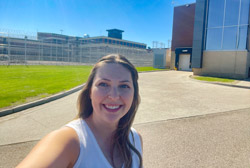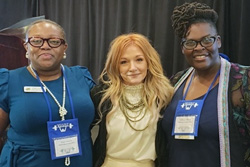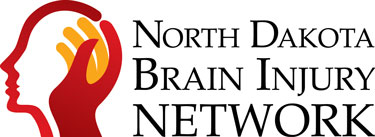NDBIN Newsletter – Summer 2024
2024 Virtual Concussion Symposium
![]() September 13
September 13
9:00 am – 4:30 pm Central
The Call for Presentations is now open for the 2024 Virtual Concussion Symposium hosted by the North Dakota Brain Injury Network (NDBIN). Presentations should feature topics of interest to the community that highlight new innovative research, trends, practice strategies, and collaborative models of care for individuals that have sustained a concussion or a mild traumatic brain injury.
Deadline: July 10 at 4:00 pm Central
North Dakota Brain Injury State Plan
The North Dakota Brain Injury Advisory Council, in coordination with the Brain Injury Survivor Engagement Group, developed a four-year brain injury state plan. The state plan prioritizes efforts and activities aimed at improving the quality of life for all individuals with brain injury and their families.
Learn more about the brain injury state plan, including resources and how to become involved.
Did You Know? Drowning Can Cause Brain Injury
Drowning is the leading cause of death to children ages 1-4 in our country. Older children are also at risk of drowning. Open water, like lakes and ponds, happen to be the highest environment of drownings at 43% of occurrences, followed by pools at 38%, bathtubs at 9%, and “other” locations for 10%.
Drownings can also cause brain injury, due to oxygen deprivation. When someone drowns, water enters their lungs, which prevents oxygen from reaching their brain and blood. Find more information and tips at Safe Kids Worldwide.
Water Safety Tips:
- Watch kids in and around water without being distracted. Keep young children and inexperienced swimmers within arm's reach of an adult.
- Teach kids how to swim in open water, which is different from swimming in a pool.
- Use a U.S. Coast Guard-approved life jacket appropriate for the child's weight and water activity.
- Learn CPR and basic rescue skills.
- Have a designated “water watcher” when there are several adults present. A water watcher is a responsible adult who agrees to watch the kids in the water without distractions. After a certain amount of time (such as 15 minutes), the water watcher designee is passed to another adult, who is responsible for the active supervision. Even better, have a water watcher card and put it on a lanyard.
Bike Safety – Wear your Helmet
![]() They may not be the coolest accessory, but helmets are true lifesavers. This essential gear plays a crucial role
in preventing brain injuries, which can have devastating consequences.
They may not be the coolest accessory, but helmets are true lifesavers. This essential gear plays a crucial role
in preventing brain injuries, which can have devastating consequences.
Whether you're a toddler learning how to ride a bike, a cyclist hitting the trails, a skater mastering new tricks, a parent on a bike ride with their child, or a scooter rider zipping through town, a helmet is your brain's best friend. Here's why:
- Impact absorption: Helmets are designed to absorb the force of a blow, reducing the impact on your skull and brain. This can significantly lower the risk of serious injuries like fractures, contusions (bruising), and even bleeding in the brain.
- Reduced severity: Even in falls that seem minor, a brain injury can occur. Helmets help lessen the severity of these bumps and falls, potentially preventing concussions and other debilitating conditions.
It's not just for kids.
While helmet use is often emphasized for children, adults are just as susceptible to head injuries. Whether you're riding a bike for exercise, commuting to work, or enjoying a leisurely rollerblading session, wear a helmet. It sets a good example for younger generations and prioritizes your own well-being.
So, the next time you head out for an activity that involves wheels or potential falls, remember – your brain is precious. Protect it with a helmet. It's a small investment that can make a world of difference.
NDBIN Collaborating with the Criminal Justice System
 Andrea Sailer, NDBIN resource facilitator, has been working diligently with prisons across the state including
the North Dakota State Penitentiary (Bismarck), James River Correctional Center (Jamestown), Missouri River
Correctional Center (Bismarck), and Dakota Women’s Correctional and Rehabilitation Center (New England). Andrea
has been providing training and education to staff, inmates, and peer support specialist inmates. Future plans
currently include offering our Living Life Fully training to brain
injury survivors within the criminal justice system to provide them with the tools and techniques to help them
understand, cope with, and proactively manage life after brain injury.
Andrea Sailer, NDBIN resource facilitator, has been working diligently with prisons across the state including
the North Dakota State Penitentiary (Bismarck), James River Correctional Center (Jamestown), Missouri River
Correctional Center (Bismarck), and Dakota Women’s Correctional and Rehabilitation Center (New England). Andrea
has been providing training and education to staff, inmates, and peer support specialist inmates. Future plans
currently include offering our Living Life Fully training to brain
injury survivors within the criminal justice system to provide them with the tools and techniques to help them
understand, cope with, and proactively manage life after brain injury.
Shannan in New York
 The National Lifespan Respite Conference hosted by ARCH (Access to Respite Care and Help) was held in Albany,
New York, on May 21-23. The theme, Raise the Bar for Respite, brought top notch presentations in keynote,
plenary, and breakout sessions, expanding the scope of possibilities and modalities in respite care for all in
attendance. North Dakota attendees were Alexis Witt, Christiana Pond, Jessie Markovic, and Shannan Stanke, NDBIN
resource facilitator.
The National Lifespan Respite Conference hosted by ARCH (Access to Respite Care and Help) was held in Albany,
New York, on May 21-23. The theme, Raise the Bar for Respite, brought top notch presentations in keynote,
plenary, and breakout sessions, expanding the scope of possibilities and modalities in respite care for all in
attendance. North Dakota attendees were Alexis Witt, Christiana Pond, Jessie Markovic, and Shannan Stanke, NDBIN
resource facilitator.
Webinar Wednesdays

These FREE webinars are designed to meet your needs whether you are a brain injury survivor, caregiver, or professional. Continuing education units (CEUs) are available for social work. Some upcoming webinars include:
- July 24 – Resilient Roots
- August 7 – Why the Eyes Are a Window Into the Brain After a Brain Injury
- August 21 – Healthy Living for Your Brain and Body
- September 4 – Wives of Chronic Traumatic Encephalopathy
- September 18 – Your Story Is Your Superpower
- October 2, 16, 30 – The Rancho Los Amigos Scale of Cognitive Recovery: A Guide to Understanding and Managing Recovery After Brain Injury (three-part series)
Ongoing Support
As always, NDBIN has several programs that can help brain injury survivors, family members, professionals, caregivers, and friends. All our services are FREE. Eligible people include North Dakota residents. Email info@ndbin.org or call (855) 866-1884 today for more information.
